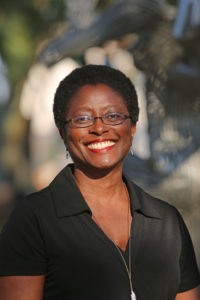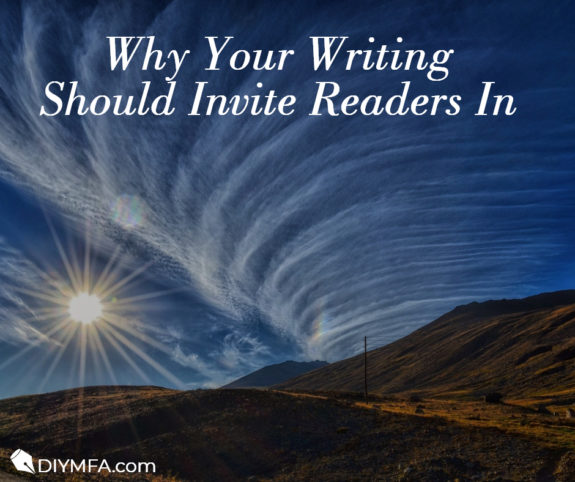I’m guilty. Of overwriting. Of indulging in hooptedoodleeandering.
But not always. I just completed National Poetry Writing Month (NaPoWriMo). I wrote a poem and posted it on my blog everyday in April. I chose to do NaPoWriMo because I often overthink when I write, which leads me to overwrite. Or worse, freeze up and not write.
During NaPoWriMo, I didn’t have time to obsess over word choice or subject matter. I chose a subject, a form, and wrote. Everything down to the chassis. Clean lines (mostly) and spare language. Were the poems beautiful? Were they crafted well? Probably not, but they were immediate and communicative. My readers responded to their rawness. They liked the simple but descriptive language. They asked me to continue writing and posting daily poems after NaPoWriMo ended.
I write a column for my local paper. Thanks to the headshot which appears alongside the column, I am recognized at times. Readers ask me questions on specific articles. Most often, they tell me they read the column because it’s interesting and gives information in an easy-to-read, easy-to-understand format.
I’m not trying to convince you that I’m a minor celebrity. I see those readers’ statements as evidence I fulfilled my duty as a writer.
Writerly Duty and Responsibility
Some writers say they don’t write for their readers. They write only what they’re interested in. Only what the muse or their imagination leads them to create. I’m ambivalent about that view of writing. Who doesn’t want to create freely without outside opinion? But if you don’t consider your reader and what you want to communicate, your writing will fall flat. Or worse, close the entrance into the world(s) you want to share.
Writing is a conversation between writer and reader. Our responsibility/job as writers is multi-faceted. Our words are:
- Mirrors for our readers to see themselves and society
- The first part of a circuit that our readers complete
- Glimpses into alternate possible realities
So our duty and responsibility is to:
- Remember that, although we write alone, there is another in the room — our reader
- Be clear — whether you’re writing about rocket science or poetry. Readers can’t support you if they don’t understand you. They’ll get tired of working so hard.
- Be imaginative without being obscure
Don’t make your readers scale walls and dig tunnels to get into your work. Build a door for them. But, being accessible doesn’t mean your work is shallow.
Nothing Shallow Here, Folks
You’re thinking “Brenda wants to take all the mystery out of my art.”, right? Wrong. I want us writers to have readers and the chance to do what we all want: get our voices out into the world. None of us wants to write/speak/create in a void.
So, let me dispel your fears with a few current (and not so current) excerpts of “accessible, not shallow”, still beautiful work.
Soil, Irène P. Mathieu, from “Orogeny” (Bob Kaufman Book Prize):
the way you say soil
sounds like soul, as in
after we walked through the woods
my feet were covered in soul
when it rains
the soul turns to mud
the soul is made of decomposed
plant and animal matter;
How it Felt, Sharon Olds, from “Poetry”, April 2018:
[…] And when my body came out
the other side, and I checked myself,
10 fingers, 10 toes,
and I checked whatever I had where we were
supposed to have a soul, I hardly dared
to know what I knew,
that though I had been taken down,
again, hammer and tongs, valley
and range, down to the ground of my being
and under that ground, it was possible
that in my essence, at the center of my essence, in some
tiny chamber my mother could not
enter — or did not enter — I had not been changed.
Marie, Edward P. Jones, from “Lost in the City”:
“You done crippled me, you old bitch.”
“I sure did,” she said, without malice, without triumph, but simply the way she would have told him the time of day had he asked and had she known. She gripped the knife tighter, and as she did, she turned her body ever so slightly so that her good eye lined up with him. Her heart was making an awful racket, wanting to be away from him, wanting to be safe at home. I will not be moved, some organ in the neighborhood of the heart told the heart. “And I got plenty more where that come from.”
Spring Plowing, Ted Kooser, from The Nebraska Project video, Passing Through:
The field mice are moving their nests
to the higher ground of fence rows,
the old among them crying out to the owls
to take them all. The paths in the grass
are loud with the squeak of their carts.
They keep their lanterns covered.
The works above are straightforward but inventive, and speak to the reader. One recent work, that epitomizes what I feel we writers should strive for, is Nnedi Okorafor’s Binti. It is a novella but easily shoulders the aims — profundity, invention, and simplicity — all writers should embrace.
It all looks easy on the page, I know. So, how do you invite readers into your writing? First, know your readers. If you’re a newbie writer, envision your ideal readers. If you’re a bit more established and have a base of readers, ask them directly what they get from your work. Gabriela Pereira’s book, DIY MFA, has an excellent chapter, Know Your Reader, with step-by-step information and techie tools to discover who your readers are. Then imagine your computer screen as a window with your ideal readers on the other side, listening to your words. Are you saying what you want to say in a language they can understand?
Ultimately, our words should burrow into readers, put down roots, and flower when needed at our readers’ idle moments or times of stress. They are, to paraphrase June Jordan’s “These Poems”, “things that [we] do/in the dark/reaching for [readers]/whoever [they] are”.
 Brenda Joyce Patterson is a poet, writer, librarian, and lover of short writing forms. Her poetry and flash fiction have been published in Vayavya, Gravel Magazine, and Melancholy Hyperbole. Along with works by Maya Angelou, Gwendolyn Brooks, and Alice Walker, her travel essay “The Kindness of Strangers” appeared in Go Girl: The Black Woman’s Guide to Travel and Adventure.
Brenda Joyce Patterson is a poet, writer, librarian, and lover of short writing forms. Her poetry and flash fiction have been published in Vayavya, Gravel Magazine, and Melancholy Hyperbole. Along with works by Maya Angelou, Gwendolyn Brooks, and Alice Walker, her travel essay “The Kindness of Strangers” appeared in Go Girl: The Black Woman’s Guide to Travel and Adventure.







